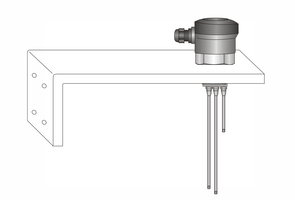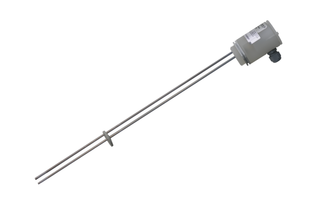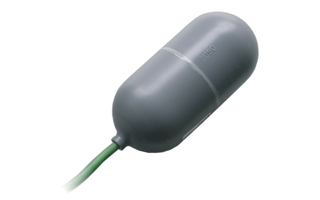- Compact construction with integrated evaluation electronics
- cost-efficient to purchase
- Easy to install
- Robust
- Adjustable sensitivity
- Adjustable switching delay
- Potential-free output
The electrodes are used for conductive detection of limit levels. The areas of use cover all sectors where liquid and conductive media are to be detected or controlled.
Limit value measurements (overflow, dry run, max. alarm) as well as min./max. control and pump control (hysteresis) can be implemented.
Construction
The compact electrode ET-4 can be used on site for optimum utilisation of cramped conditions. The electrode consists of an enclosure with up to 5 rod electrodes. The unit can be fastened using a G1¼" connection thread. The enclosure contains the built-in evaluation electronics and is equipped with 1 to 4 output relays depending on the type.
Function
A low alternating current flows once the electrode is submersed into a conductive liquid. This alternating current is evaluated by the switching amplifier (electrode relay). Exceeding an adjustable trigger threshold will energise the according relay.
Sensitivity as well as switching delay and the two-step pump control can be pre-selected directly on the unit using DIP switches.
Typical applications for compact electrodes
- Shafts/containers with pump control
- Overflow messages and limit level monitoring
- Limit level messages for release/counters on stormwater treatment plants
- Dry run protection
- and many more
| Common | |
|---|---|
| Switching delay | 0.5 or 2 seconds |
| Sensitivity | 3 KΩ; 10 KΩ; 30 KΩ; 100 KΩ |
| Relays |
|
| Humidity | 90 %, non-condensing |
| Storage temperature | −20 °C to +85 °C |
| Operating temperature | −20 °C to +85 °C |
| Connection thread | G1¼” |
| Material |
|
| max. operating pressure | 10 Bar |
| Rod length | 1 - 3 Meter |
| Number of electrodes | 2 - 5 |
| Power consumption | 2 W |
| Power supply | 24 V DC ±15 % |
Specifications subject to change.
![[Translate to English:] Kompaktelektrode ET4 zur Grenzwerterfassung in leitfähigen flüssigen Medien [Translate to English:] Kompaktelektrode ET4 zur Grenzwerterfassung in leitfähigen flüssigen Medien](/fileadmin/_processed_/e/3/csm_Kompaktelektrode_d10f3f8a02.png)


